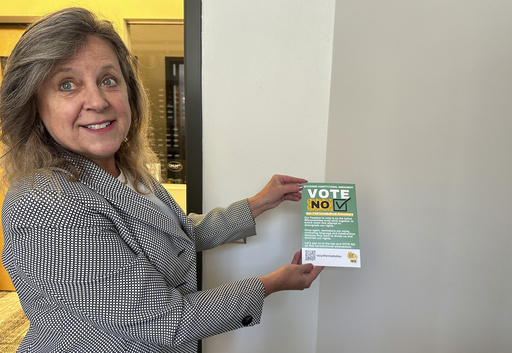
Voters in Wisconsin will have an additional decision to consider at the upcoming presidential election in November—the opportunity to vote on a statewide referendum aimed at explicitly prohibiting foreign nationals from participating in elections.
This proposal, introduced by Republican lawmakers, seeks to amend the Wisconsin constitution to ensure that only U.S. citizens are eligible to vote in any elections conducted within the state.
This initiative aligns with a broader Republican movement that has emerged across the nation, prompted by instances in certain municipalities where noncitizens have been allowed to vote in local elections.
States such as North Dakota, Alabama, Florida, Colorado, Ohio, and Louisiana have enacted similar laws recently, with Wisconsin joining eight other states, including Iowa, Kentucky, and Missouri, in this electoral consideration.
Proponents of the amendment, primarily Republicans, assert that the measure is essential for maintaining election integrity, particularly in light of increasing immigration across the southern border.
Conversely, Democrats and opponents argue that the amendment is unnecessary—citing that no local governments in Wisconsin currently permit noncitizen voting—and view it as a strategy to mobilize conservative voter turnout while heightening anti-foreign sentiments.
Jeff Mandell, an attorney with Law Forward, a voter rights advocacy organization, remarked that the proposed amendment represents a nonexistent problem rather than a solution to one.
Voting by noncitizens is extremely uncommon, according to data from the Pew Research Center. In 2020, over 25 million people residing in the U.S. were not citizens, which included around 12 million permanent residents and 11 million undocumented migrants living in the country.
Moreover, a federal law established in 1996 already prohibits noncitizens from participating in federal elections.
Although no state constitutions explicitly allow noncitizen voting, many states have legislation that forbids noncitizens from participating in statewide elections.
State-level reports indicate that instances of noncitizen voting are rare, though Republicans have pointed to voter registration audits that suggest the presence of potential noncitizens on the rolls.
For example, Texas Governor Greg Abbott announced the removal of over 6,500 individuals from voter registration lists since 2021 who were identified as potential noncitizens.
Similarly, Ohio’s Secretary of State, Frank La Rose, noted that he had referred 138 cases of noncitizens who voted to authorities for legal action. Likewise, Alabama’s Secretary of State mentioned the deactivation of over 3,000 individuals identified as noncitizens on their voter registration rolls.
While some municipalities in states like California, Maryland, and Vermont, as well as in Washington D.C., allow noncitizens to participate in specific local elections, Republicans remain concerned that this trend may spread further.
The current wording of Wisconsin’s constitution affirms that every U.S. citizen is a valid elector. The proposed amendment would clarify this to state that only U.S. citizens may vote.
According to State Representative Tyler August, who is leading the effort in the Assembly, the intent is to deliver a definitive clarification that foreign nationals are not permitted to vote in Wisconsin.
He acknowledged that noncitizen voting legislation in other states was a motivating factor behind the proposal but dismissed the notion that it discriminates against foreign nationals or that it was an effort to mobilize conservative voters. August expressed confidence that Republicans would still turnout for the election with enthusiasm regardless.
State procedures require that constitutional amendments achieve passage through two consecutive legislative sessions and then receive voter approval via a statewide referendum. The amendment garnered approval from Republican lawmakers in both 2022 and the previous year without any support from Democratic representatives. Notably, Democratic Governor Tony Evers does not participate in the approval process for constitutional amendments.
Support for the amendment appears limited, with only one registered group, Wisconsin Family Action—a conservative organization focused on marriage, family, and religious liberties—expressing backing for the initiative.
In contrast, a variety of organizations, including the American Civil Liberties Union and the League of Women Voters, have expressed opposition, alongside more than 30 groups including Law Forward and immigrant advocacy organization Voces de la Frontera.
These opponents describe the amendment as a concerning power play that promotes discrimination and paves the way for further anti-immigrant measures.
They urge the electorate to reject the measure, claiming it detracts from everyone’s voting rights by shifting from “every” citizen to “only” citizens.
The coalition emphasizes that the amendment will create tangible harm to voter rights, calling for voters in Wisconsin to stand against the change.
